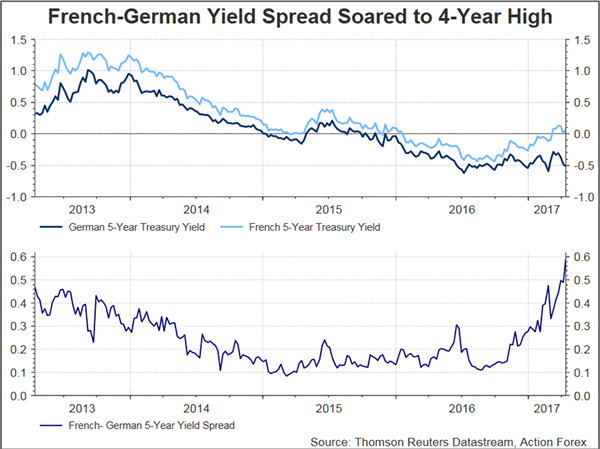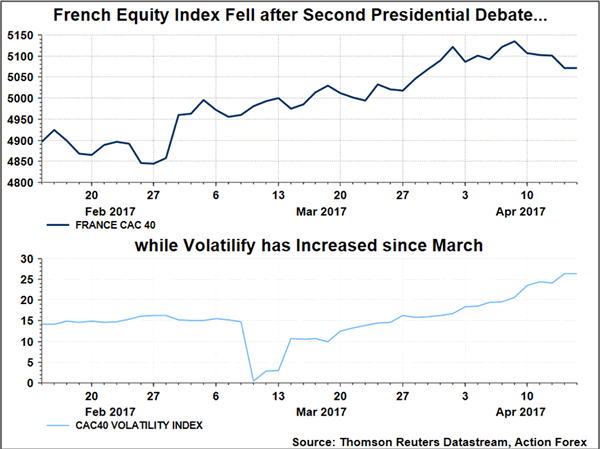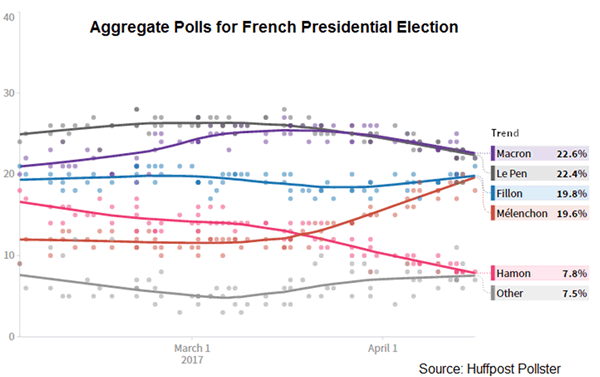With less than a week to go, concerns over two euro-sceptic candidates, far-right Marine Le Pen and far-left Jean-Luc Melenchon entering the run-off have clearly escalated. Support for Melenchon has surged since the second debate held earlier this month. We believe such scenario is still having a low chance based on analysis on trends in polls. And, our base case remains unchanged that centrist Emmanuel Macron and Le Pen will enter the second round. However, following Brexit referendum and US president Donald Trump’s victory, there has been increasing doubts over the predictivity of opinion polls.
French government bonds dumped and stocks volatility rose
Taking a look at recent market actions, the unsettled situation in France weighed on French government bonds, sending the 5-year French-German yield spread to the highest level since 1Q13.

French equities got dumped with volatility increased after the TV debate, while the single currency remained pressured.

Melenchon closing down the gap with others
Support for Melenchon rose from 11% to 15% after the first presidential debate. After the second debate, his support increased further to 19%, making him only a percentage point below conservative François Fillon and four below Macron and Le Pen. As a far-left candidate, Melenchon proposes the reform the labor ordinance, raising the minimum wage, reducing working hours and lowering the retirement age. The main similarity between his platform and far-right (or perhaps populist) candidate Le Pen’s is the skepticism over the EU and globalization. This underpinned recent volatility in European financial markets amidst the surge in Melenchon’s support.

Total left-wing support steady
That said, we see the chance for Melenchon to enter the second and final round of election is low. Recent surge in Melenchon’s support is at the expense of Benoit Hamon’s, a candidate also in the left-wing political spectrum (less extreme than Melenchon, though). Total support of left-wing candidates has been steady at 25-30% since the beginning of the year, suggesting Melenchon indeed failed to draw support from the centrist and/or rightist supporters.
Melenchon’s support closing to limit
If Melenchon’s support has to increase further, it would likely continue to come from Hamon. Recall that, around 2 million people voted in Parti Socialiste’s presidential primary in January, of which 59% (around 1.1M) voted for Hamon, making him the candidate representing the party. We assume most of the 2 million people would vote for Hamon. With a turnout rate of 70%, support for Hamon would remain around 6%. This would make Melenchon surpass Fillon but still fails to become the top 2 in the first round.
Hence, our base case remains centrist Emmanuel Macron and Marine Le Pen would enter the second and final round with the eventual victory goes to the former.
Risks lie in accuracy of polls
The biggest uncertainty lies in the election is actually the predicting power of opinion polls. Opinion polls showed that both the Brexit referendum and the US presidential election were neck-and-neck races, with Bremain and Clinton’s victory leading marginally. The outcomes, however, have disappointed most. It is possible that in the upcoming French election, the hidden votes and the inability of polls to capture the trend might give the world another surprise.
